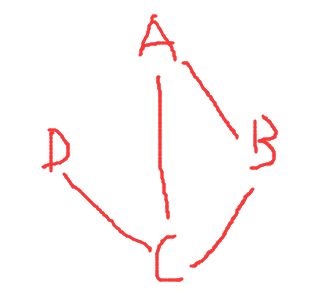图结构在处理比较复杂的数据关联是常用到的一个数据结构,前面提到的树结构就是属于图的子集。
python官方提供的解决方案(https://www.python.org/doc/essays/graphs/)中用字典来处理图结构。
树结构通常用来处理1对多,而图则用来处理多对多的问题,比如城市电网问题,a城市的光纤连通了b、c城市,b城市连通了a、c,c连通b、d,d连通c。 我们想知道从a到d的是否联网,如果连了,可以选择那些路线(全部路线问题),或者怎么样让光纤走最少的城市(最少节点问题),或者怎么样从a到d拉光纤最短(最短路径问题,比较复杂,下次探讨)
可以简化成一个简单的无向图,如下

class Graph():
#查询所有路径
def find_all_path(self,graph_dict,start,end,path=[]):
path = path+[start] #这里不可以用append,否则将改变path的原值,=赋值可以后path成为局部变量
if start == end:
return [path]
paths = []
if start in graph_dict:
dict = graph_dict[start]
for i in dict:
if i not in path:
newpath = self.find_all_path(graph_dict, i, end,path)
if newpath:
paths.extend(newpath)
return paths
# return paths
#查询节点最少路径 2种办法,一种直接用上面的方面,每次递归通过长度判断更小的path,递归完获取最小的
#第二种通过队列,可以不必递归完成所有路线的判断,如下
def find_short_path(self,graph_dict,start,end,path=[],list=[]):
path = path + [start]
if start == end:
return [path]
if start in graph_dict:
dict = graph_dict[start]
for i in range(len(dict)):
list.append((path,dict[i]))
# print(list)
for i in list:
if type(i)==tuple:
path = i[0]
i = i[1]
if i not in path:
list.pop(0)
return self.find_short_path(graph_dict, i, end, path,list)
if __name__ == '__main__':
'主函数'
# 无权重值路线查找
# 连通图(无向无权重值的图)
graph_dict = {
'a':['b','c'],
'b':['a','c'],
'c':['d','b'],
'd':['c']
}
graph = Graph()
start = 'a'
end = 'c'
print('所有路线',graph.find_all_path(graph_dict,start,end))
print('最少节点路线',graph.find_short_path(graph_dict, start, end))所有路线 [['a', 'b', 'c', 'd'], ['a', 'c', 'd']]
最少节点路线 [['a', 'c', 'd']]